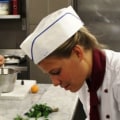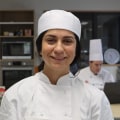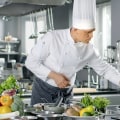A specialized skill often taught in cooking schools is the arts of baking and pastry, with topics such as the fermentation of bread, the functions of ingredients and the proportions of cream. And of course, one of the most important skills is experience. In an educational setting, you will be asked to practice techniques to learn from your successes and mistakes. One of the main cooking skills learned in cooking school is the efficient and safe skill with the knife.
The four basic knife skills that anyone studying culinary arts will learn are dicing, chopping, julienne and chiffon. Mastering this basic skill in a cooking institute will give you speed and uniformity in food preparation. Learning to remove the seeds of a red pepper or how to braise a fillet of brisket may seem like a basic cooking skill, but cooks and chefs have to do much more than simply prepare food. A list of cooking skills includes food preparation, but kitchen professionals will also need to master related skills, such as maintaining a safe and hygienic cooking environment and presenting food in an attractive way.
Several cooking schools and culinary organizations maintain their own lists of necessary cooking skills, but these checklists share several key components. Chefs and cooks must understand the preparation work in the kitchen before preparing meals. Cooking skills include testing the freshness of food ingredients, according to the U.S. Professional and Technical Education Resource Center, South Virginia, states that chefs must use basic knife skills to prepare meats, fruits and vegetables for use in the kitchen.
Using knowledge of weight and volume, cooks can convert standard recipes into larger or smaller batches. Preparing basic sauces or soups for use in more complex recipes is another essential cooking skill. Chefs and chefs must master a basic list of cooking techniques, according to the Homemade Baking Association. For example, cooks learn to peel and separate eggs efficiently.
Kneading the dough, peeling vegetables, adding the ingredients, simmering, boiling and making cream are other examples of cooking skills. Roasting, grilling or browning also contribute to basic cooking. For some budding chefs, it might be wise to learn special techniques related to regional or international cuisine. For example, cooking skills can include creating sushi rolls or gelling meats.
Cooking can't be done safely in an unhygienic environment, so cooking skills include basic hygiene and sanitation. As part of some certification processes, chefs should be able to analyze a kitchen or storage area to determine if food preparation will be safe and hygienic, according to the American Association for Family and Consumer Sciences. Chefs should also review food preparation processes that are carried out under their supervision to ensure that they meet legal health and safety requirements. Taking care of personal hygiene, such as washing your hands, cleaning pots and pans properly, storing dirty kitchen clothes and storing food at safe temperatures, are examples of cooking skills.
Other cooking skills relate to art and business. For example, chefs learn to present food in an attractive way so that the meal is a pleasing aesthetic experience for guests. Menu planning involves using seasonal foods to maintain a reasonable kitchen budget and, at the same time, make the most of the ingredients in several recipes. Reflecting on taste, flavor and time management is crucial.
Food should not only be tasty, but it must be ready at the right time. For example, chefs time preparation so waiters can deliver appetizers to the table before main courses. The cornerstone of many dishes, learning to chop an onion efficiently can speed up the preparation of endless dinner. Take a few minutes and learn how to cut into slices like a pro with our video of how to chop an onion below.
We've also been discussing ways to keep tears at bay; apparently, sucking on a teaspoon while it cuts will keep your eyes dry. .


